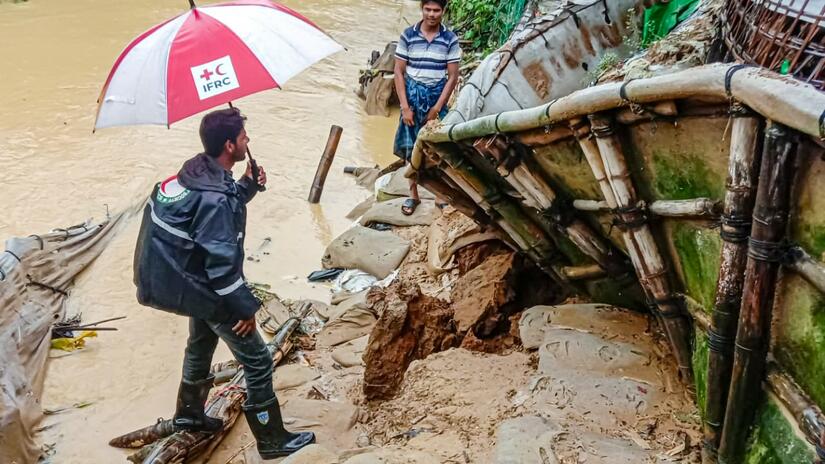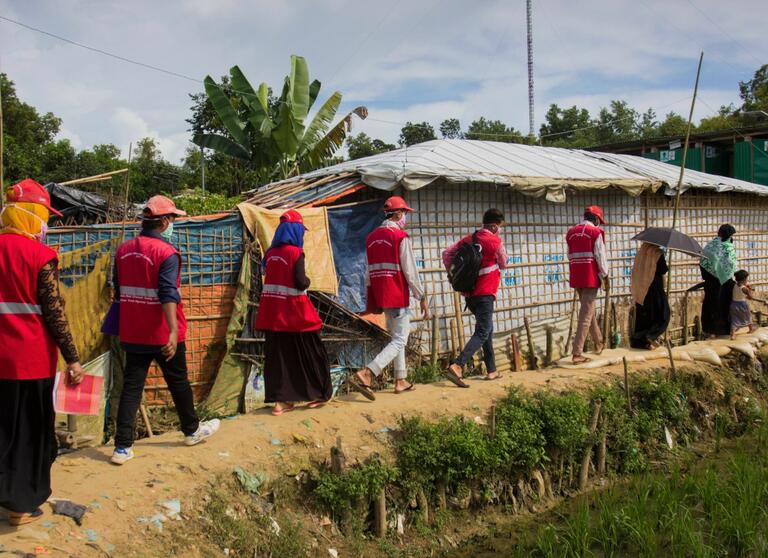Geneva/Kuala Lumpur/Dhaka, 24 August 2023: Six years after displacement from Rakhine State in Myanmar, nearly one million people still reside in Cox’s Bazar camps, and 30,000 people are in Bhasan Char. The situation is dire, with the displaced population continuing to face multiple and simultaneous threats, including fires, climate-related disasters, and epidemics in crowded, temporary shelters. With challenges mounting and resources shrinking, the International Federation of Red Cross and Red Crescent Societies (IFRC) calls for sustained global support, particularly for durable solutions and improved settlements.
The Bangladesh Red Crescent Society, IFRC, and partners, including the Bangladesh government, have assisted over a million people from displaced and host communities. Still, challenges remain for those in congested camps.
In the past year, challenges like 33 fire incidents, Cyclone Mocha, and funding shortfalls have heightened vulnerabilities related to malnutrition, security, and education. The IFRC stresses the importance of ongoing investment in settlements and camp management to uphold the dignity of camp residents. Presently, living spaces average 24 sqm per person, falling short of the 30 sqm global standard. While the Red Cross and Red Crescent provide shelters meeting basic requirements, more support is needed to protect vulnerable camp and host community members, ensuring their safety, privacy, and dignity.
The Secretary General of Bangladesh Red Crescent, Kazi Shofiqul Azam said:
“We stand with the displaced people and the local communities that have generously hosted them in Cox’s Bazar. We’ve witnessed the aftermath of the sufferings caused by flash floods, fire incidents, and the recent Cyclone Mocha in Cox’s Bazar camp. We’ve immediately responded to each disaster and repeatedly rebuilt damaged shelters. With fire incidents on the rise and Cox’s Bazar being highly susceptible to cyclones, there’s a growing need for improved shelter and infrastructure.
The resilience of the displaced people from Myanmar has been truly exceptional. They deserve to live with dignity and hope until they can safely repatriate. We remain committed to working alongside them and our partners to collectively alleviate their sufferings.”
To date, the Bangladesh Red Crescent has facilitated nearly 2 million health consultations, and over 60,000 families have received 1.1 billion litres of safe drinking water. Despite these efforts, durable solutions remain essential, especially given the challenging living conditions. Continued international support is crucial to ensure that people in these camps can return to their places of origin with dignity once it's safe to do so.
The IFRC Head of Delegation in Bangladesh, Sanjeev Kafley, added:
“Six years into the crisis, our commitment remains firm. We stand by the many who continue to remain displaced, offering them a helping hand, a compassionate heart, and a voice that echoes their struggle for dignity, and a better tomorrow.
As we navigate this protracted crisis, finding durable solutions becomes imperative. Yet, year by year, needs grow while funding gaps widen. This overlooked crisis risks the very services, relief supplies, and healthcare that thousands rely on. Without renewed attention, we risk being forced to prioritize support solely for the most vulnerable. We urge the international community to reengage and support, before lives are further impacted.”
The IFRC and Bangladesh Red Crescent have been steadfast in supporting both displaced people and host communities from the beginning. However, the appeal is significantly underfunded. Only 61.5% of the CHF 133.2 million needed has been raised, leaving a gap of over CHF 51.2 million. Learn more about the emergency appeal.
For more information or to arrange an interview, contact: [email protected]
In Cox's Bazar: Barkat Ullah Maruf, +880 1711222922, SM Taslim Reza, +880 1759004869
In Dhaka: Al-Shahriar Rupam, +880 1761775075
In Kuala Lumpur: Afrhill Rances, +60 192713641
In Geneva: Mrinalini Santhanam, +41 763815006





